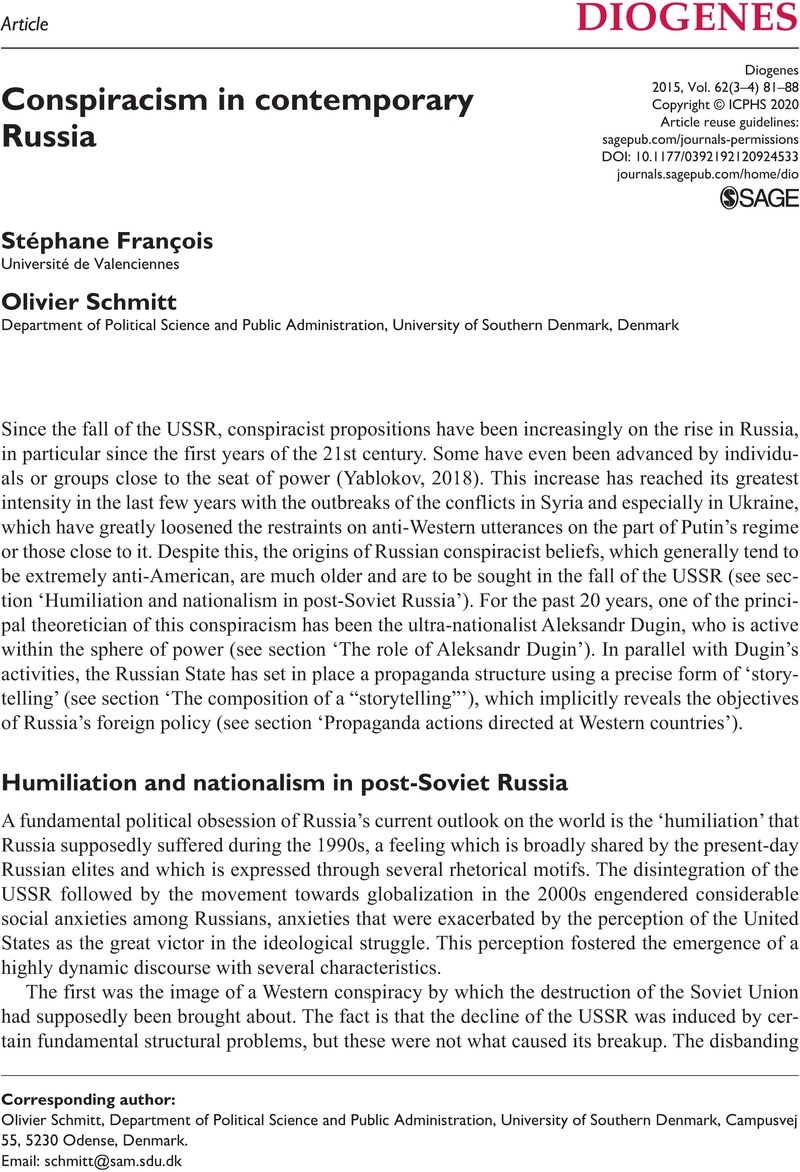No CrossRef data available.
Article contents
Conspiracism in contemporary Russia
Published online by Cambridge University Press: 01 January 2024
Abstract
An abstract is not available for this content so a preview has been provided. Please use the Get access link above for information on how to access this content.

- Type
- Conspiracy Theories in former Communist countries
- Information
- Copyright
- Copyright © ICPHS 2020
References
Chaudet, D, Parmentier, F, Pélopidas, B (2007) L’Empire au miroir. Stratégies de puissance aux États-Unis et en Russie. Geneva: Droz.Google Scholar
Dugin, A (1992) Le complot idéologique du cosmisme russe. Politica Hermetica 6: 80–89.Google Scholar
Dugin, A (2012) La Quatrième Théorie politique: La Russie et les idées politiques au XXI e siècle. Nantes: Ars Magna.Google Scholar
Dugin, A (2013a) L’Appel de l’Eurasie. Conversation avec Alain de Benoist. Paris: Avatar.Google Scholar
Franke, U (2015) War by non-military means Understanding russian information warfare. foi Report. Available at: https://www.foi.se/rapportsammanfattning?reportNo=FOI-R–4065–SEGoogle Scholar
Laruelle, M (2001) Alexandre Dugin: esquisse d’un eurasisme d’extrême droite en Russie postsoviétique. Revue d’études comparatives Est-Ouest 32(3): 85–103.CrossRefGoogle Scholar
Laruelle, M (ed.) (2007) Le Rouge et le noir: Extrême droite et nationalisme en Russie. Paris: cnrs.CrossRefGoogle Scholar
Laruelle, M (ed.) (2015) Eurasianism and European Far Right: Reshaping the Europe-Russia Relationship. Lanham, MD: Lexington Books.Google Scholar
Ledeneva, AV (2013) Can Russia Modernise? Sistema, Power Networks and Informal Governance. Cambridge: cup.CrossRefGoogle Scholar
Plokhy, S (2014) The Last Empire: The Final Days of the Soviet Union. London: Oneworld.Google Scholar
Pomerantsev, P (2014) Nothing is True and Everything is Possible: The Surreal Heart of the New Russia. London: Public Affairs.Google Scholar
Rakhmanova, T (2014) Au cœur du pouvoir russe: Enquête sur l’Empire Poutine. Paris: La Découverte.CrossRefGoogle Scholar
Sarotte, ME (2014) 1989: The Struggle to Create Post-Cold War Europe (2nd edn.) Princeton: Princeton University Press.Google Scholar
Sedgwick, M (2006) Contre le monde modern: Le traditionalisme et l’histoire intellectuelle secrète du XX e siècle. Paris: Dervy.Google Scholar
Umland, A, Shekhovtsov, A (2012) Is Aleksandr Dugin a traditionalist? Russian “Neo-Eurasianism” and perennial philosophy. In: Versluis, A, Irwin, L, Phillips, M (eds) Esotericism, Religion, and Politics. Minneapolis: North American Academic Press, pp. 129–145.Google Scholar
Wilson, A (2005) Virtual Politics: Faking Democracy in the Post-Soviet World. New Haven: Yale University Press.Google Scholar
Wilson, A (2014) Ukraine Crisis: What It Means for the West. New Haven: Yale University Press.Google Scholar
Yablokov, I (2018) Fortress Russia: Conspiracy Theories in the Post-Soviet World. London: Polity.Google Scholar




